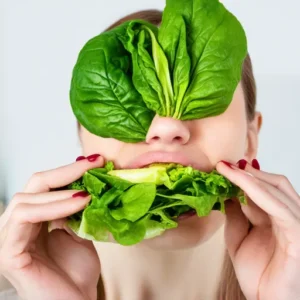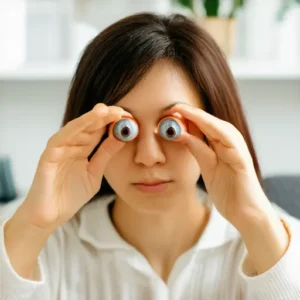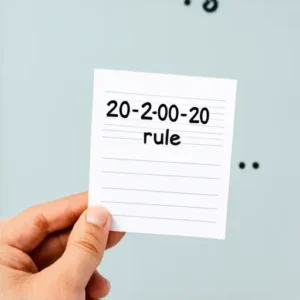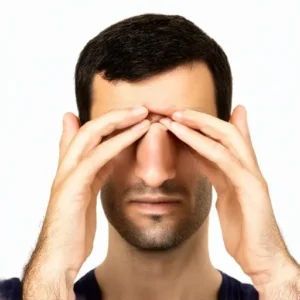Do Eye Exercises Work? Top Ways to Make Eyesight Better
Your Eyes Deserve Better: Simple, Science-Backed Ways to Improve Eyesight
Think about it – your eyes work tirelessly from the moment you wake up until you close them at night. Yet how often do we really take care of them? Whether you’re battling screen fatigue or noticing your vision isn’t as sharp as it used to be, improving your eyesight naturally is easier than you might think. But with so much advice out there (some helpful, some not), what actually works? Let’s cut through the noise and explore real, science-supported ways to give your eyes the care they deserve.
Why Your Eye Health Matters More Than You Think
Clear vision isn’t just about seeing well—it affects everything from your work performance to your safety on the road. Ever gotten headaches after a long day staring at screens? That’s your eyes begging for attention. In our digital world where screens dominate our lives, taking proactive steps for eye health isn’t just smart—it’s essential.
What’s Really Affecting Your Vision?
Several everyday factors could be quietly harming your eyesight:
- Getting older: After 40, reading menus in dim lighting suddenly becomes a challenge (hello, presbyopia!).
- Screen overload: Digital eye strain is the new normal—dry, tired eyes after hours of Zoom calls.
- Family history: If your parents wore glasses, you might be more likely to need them too.
- Diet gaps: Skimping on eye-friendly nutrients like vitamins A, C, and E can leave your vision vulnerable.
The Truth About Eye Exercises: Helpful or Hype?
You’ve probably seen claims about eye exercises fixing vision problems overnight. But what does science actually say?
What Eye Exercises Can (and Can’t) Do
Research shows certain exercises help with specific issues:
- Relieving strain: Simple techniques like palming can give overworked eyes a much-needed break.
- Improving coordination: Some exercises help eyes work together better for reading.
But here’s the reality check: No amount of eye yoga will correct nearsightedness or replace your glasses.
The Pros and Cons of Eye Workouts
Good news: They’re free, easy, and can reduce digital eye strain.
Reality check: They’re not a magic cure for significant vision problems.
Can You Ditch Your Glasses?
Sorry to disappoint, but no. While exercises support eye health, they can’t replace professional vision correction when you need it.
Everyday Habits for Healthier Vision
Small changes to your daily routine can make a big difference for your eyes:
The 20-20-20 Rule: Your Eyes’ Best Friend
Every 20 minutes, look at something 20 feet away for 20 seconds. It’s like a mini-vacation for your eyes!
Simple Techniques Anyone Can Try
Focus shifting: Alternate between looking at near and far objects—it’s like weightlifting for your eye muscles.
Palming: Warm your hands by rubbing them together, then gently cup them over closed eyes (no pressure!) for a minute of pure eye relaxation.
Eye Yoga That Actually Helps
Slow eye rolls, tracing figure eights in the air, and conscious blinking can boost circulation and fight dryness.
Feed Your Eyes: Nutrition That Makes a Difference
What you eat directly impacts how well you see—now and in the future.
Superfoods for Super Vision
- Greens: Spinach and kale pack lutein and zeaxanthin—nature’s sunglasses against macular degeneration.
- Fatty fish: Salmon’s omega-3s help keep your eyes comfortably moist.
- Colorful fruits: Blueberries and oranges deliver vision-protecting antioxidants.
Don’t Underestimate Sleep and Water
Dehydrated? Your eyes will feel it first. Tired? Hello, eye twitches and blurry vision. Aim for 7-9 hours of sleep and keep water handy all day.
Habits to Break for Better Vision
Smoking doubles your risk of serious eye diseases. And that endless scrolling? Give your eyes regular screen breaks.
Set Up Your Space for Eye Comfort
Your environment plays a bigger role in eye strain than you might realize.
Lighting Matters More Than You Think
Harsh overhead lights or window glare can tire your eyes fast. Soft, even lighting is easier on your peepers.
Ergonomics for Happy Eyes
- Keep screens at arm’s length (20-30 inches away)
- Position monitors just below eye level
- Bump up font sizes so you’re not squinting
When to Call in the Professionals
While natural methods help, some signs mean it’s time to see an eye doctor.
Red Flags Not to Ignore
- Headaches that won’t quit
- Struggling to see at night
- Sudden flashes or floaters
Natural Methods vs. Medical Solutions
For serious vision issues, glasses, contacts, or LASIK might be necessary. Think of natural methods as your daily eye maintenance routine.
Busting Common Eye Health Myths
Let’s separate fact from fiction.
The Carrot Question
Yes, carrots have vitamin A which supports eye health—but no, they won’t give you superhero vision. A balanced diet is what really helps.
Can Exercises Fix Nearsightedness?
Unfortunately not. While they can reduce strain, they can’t reshape your cornea or reverse myopia.
Your Action Plan for Lifelong Eye Health
Better vision isn’t about quick fixes—it’s about consistent care. Here’s your game plan:
- Practice the 20-20-20 rule religiously
- Feed your eyes the nutrients they crave
- Create an eye-friendly workspace
- Don’t skip those regular eye check-ups
Your eyes work hard for you every single day. Isn’t it time you returned the favor? Start with one small change today—your future self will thank you!
Ways to Increase Your Eyesight Without Surgery or Glasses
Want to Improve Your Eyesight Naturally? Here’s How
Let’s face it—our eyes are working overtime these days. Between endless screen time, sneaky nutritional gaps, and the natural effects of aging, blurry vision is becoming way too common. But before you resign yourself to a lifetime of glasses or consider invasive procedures, here’s some good news: there are natural ways to boost your eyesight. From simple dietary tweaks to easy eye exercises, let’s explore how you can sharpen your vision without going under the knife.
Glasses and Surgery Aren’t Your Only Options
Sure, glasses give you instant clarity, and LASIK can be life-changing—but neither actually fixes the underlying issues. In fact, relying too much on glasses might even weaken your eye muscles over time. And surgery? Well, let’s just say it’s not risk-free. The better approach? Strengthening your eyes naturally with daily habits backed by science.
Your Eyes Can Get Stronger—Here’s the Proof
Think of your eyes like any other muscle: they thrive on exercise and good nutrition. Research shows that targeted eye exercises, antioxidant-rich foods, and smart screen habits can improve focus, slow nearsightedness, and even ease dry eyes. The secret? Consistency. (No quick fixes here, but the results are worth it.)
Eat Your Way to Better Vision
You’ve heard “carrots are good for your eyes,” but that’s just the beginning. What you eat directly fuels your eye health—protecting your retinas, fighting oxidative damage, and keeping age-related decline at bay.
Top Vision-Boosting Foods
- Leafy greens: Spinach and kale are loaded with lutein and zeaxanthin—your eyes’ natural sunglasses against blue light.
- Carrots (and sweet potatoes): Their beta-carotene turns into vitamin A, a must for night vision.
- Fatty fish: Salmon and mackerel deliver omega-3s that combat dry, irritated eyes.
- Eggs: The yolks pack zinc and antioxidants to shield your cornea.
Must-Have Nutrients for Sharp Eyes
Add these to your grocery list:
- Vitamin A: Prevents night blindness (hello, sweet potatoes and liver).
- Vitamin C: Strengthens delicate eye blood vessels (oranges and bell peppers are great).
- Vitamin E: Protects eye cells from damage (snack on almonds or sunflower seeds).
- Zinc: Keeps your retina in top shape (found in chickpeas and oysters).
Don’t Forget to Hydrate
Dehydration isn’t just about thirst—it can leave your eyes dry and vision blurry. Drink up (aim for 8-10 glasses daily), and munch on water-rich foods like cucumber or watermelon for an extra boost.
Eye Exercises: A Gym Session for Your Peepers
Just like squats tone your legs, these simple moves strengthen your eye muscles and reduce strain.
The 20-20-20 Rule (Your Eyes Will Thank You)
Every 20 minutes, look at something 20 feet away for 20 seconds. This tiny habit gives your eye muscles a much-needed breather from screens.
Two Quick Stress-Busters for Tired Eyes
- Palming: Rub your hands warm, then gently cup them over closed eyes for a minute. Instant relaxation!
- Blinking drills: Rapidly blink for 30 seconds to refresh dry eyes—it’s like hitting the reset button.
Flex Your Focus
Hold a pen at arm’s length, focus on it, then shift your gaze to something far away. Repeat 10 times daily to improve your eyes’ flexibility.
Small Changes, Big Results for Your Eyes
Sometimes, the simplest habits make the biggest difference in preserving your vision.
Give Your Eyes a Break from Screens
Use blue light filters, take regular breaks, and ditch screens before bed—your eyes (and sleep quality) will improve.
Lighting Matters More Than You Think
Avoid glare by positioning screens at eye level in a well-lit room. Your neck will thank you too.
Sleep: Your Eyes’ Repair Time
While you’re catching Z’s, your eyes are busy rehydrating and healing. Aim for 7-9 hours to wake up with brighter, less puffy eyes.
Nature’s Eye Remedies (Tried and Tested)
Before modern medicine, people turned to these traditional solutions—and some still swear by them today.
Bilberry and Ginkgo: The Dynamic Duo
Bilberry extract sharpens night vision, while ginkgo boosts blood flow to your retinas.
Soothing DIY Eye Treatments
A dab of aloe vera gel mixed with raw honey (applied around the eyes, never inside) can calm inflammation.
Ancient Wisdom for Modern Eyes
Try Trataka (focused candle gazing) to improve concentration, or rinse tired eyes with chilled rose water.
Flush Out Toxins for Clearer Vision
Your eyes thrive on cleanliness—inside and out. Here’s how to support them:
Water: Your Eyes’ Best Friend
Staying hydrated maintains your eyes’ gel-like vitreous humor, reducing those annoying floaters.
Detox for Your Eyes
Sip green tea (packed with eye-friendly catechins) or lemon water to help your liver—which indirectly benefits your vision.
Cut Back on Eye-Drying Culprits
Too much coffee or alcohol dehydrates your whole body—eyes included. Enjoy in moderation.
Protect Your Vision Before Problems Start
An ounce of prevention is worth a pound of cure—especially for your precious eyesight.
Sunglasses Aren’t Just a Fashion Statement
UV rays speed up cataracts and macular degeneration. Always choose shades that block 100% UVA/UVB rays.
Don’t Skip Your Eye Exam
Annual check-ups catch silent threats like glaucoma early, when they’re easiest to treat.
If You Smoke, Here’s Another Reason to Quit
Smoking doubles your risk of cataracts and damages your optic nerve. Quitting improves blood flow to your eyes almost immediately.
Your Long-Term Game Plan for Better Vision
Natural vision improvement isn’t an overnight miracle—but with steady effort, you can see real results. Start small: toss more greens into your meals, practice the 20-20-20 rule, and prioritize sleep. Over time, these natural vision boosters will feel effortless.
Quick Recap: Top Tips for Healthier Eyes
- Load up on vision superheroes: vitamins A, C, E, and omega-3s.
- Exercise your eyes daily—yes, it’s a thing!
- Shield your eyes from screens, sun, and smoke.
Your Eyes Deserve the Best Care
Vision is priceless. By adopting these habits, you’re not just seeing better today—you’re investing in clear sight for years to come. Have you tried any natural vision tricks? Share what’s worked for you in the comments!
Best Foods & Habits: Ways to Increase Eyesight Naturally
Introduction: Why Natural Ways to Improve Your Eyesight Really Work
Let’s face it—our eyes are working overtime these days. Between endless screen time, pollution, and often skipping those veggies, it’s no wonder so many of us are squinting at our phones. But here’s the good news: natural ways to boost your eyesight aren’t just old wives’ tales. They’re science-backed, sustainable, and often more effective than quick fixes in the long run.
Think of your eyes like high-performance cameras—they need the right fuel, regular maintenance, and plenty of rest. While glasses and contacts can help in a pinch, they’re like putting a bandage on the problem. The real solution? Building habits that strengthen your vision naturally, whether you’re dealing with eye strain or just want to keep your peepers sharp for years to come.
Why We All Need to Pay Attention to Our Eyes
Here’s a wake-up call: the WHO says over 2.2 billion people worldwide struggle with vision problems—and many cases could’ve been prevented. Blame it on our screen-addicted lifestyles, bad lighting, or diets missing key nutrients. But the silver lining? Even small changes can make your eyes say “thank you.”
Your Plate Holds the Secret to Better Vision
Ever notice how eye doctors always push carrots? There’s a reason for that. Your eyes crave specific nutrients like vitamin A, omega-3s, and antioxidants found in foods like:
- Spinach and kale – Nature’s sunglasses, packed with vision-protecting lutein
- Wild-caught salmon – The ultimate retinal superfood
- Bright orange veggies – Your night vision’s best friends
Why Quick Fixes Fall Short
Sure, that new pair of glasses might make everything crystal clear today. But if you’re still staring at screens for 12 hours straight and living on takeout? You’re just putting off the inevitable. Natural methods work because they tackle eye health at the source.
Eat Your Way to 20/20 Vision
What if I told you your grocery list could be your best vision insurance? Here’s what should be on it:
The Salad Your Eyes Will Love
Next time you’re at the store, load up on:
- Carrots – Not just for rabbits (they’re packed with vision-saving beta-carotene)
- Red bell peppers – More vitamin C than oranges, great for eye blood vessels
- Sweet potatoes – Like nature’s multivitamin for your eyes
Fish Oil: Not Just for Heart Health
That salmon sushi isn’t just delicious—it’s serving up DHA, an omega-3 that keeps your retinas in top shape. Not a fish fan? Chia seeds and walnuts have your back.
Don’t Forget to Drink Up for Your Eyes
Dry, irritated eyes? You might just be thirsty. Here’s the hydration lowdown:
Water: The Original Eye Drops
Your eyes need moisture to wash away dust and stay comfortable. Eight glasses a day keeps the optometrist away (well, mostly).
Tea Time for Your Eyes
Swap your afternoon coffee for chamomile or green tea—their antioxidants give your peepers a health boost.
Simple Daily Habits That Make a Big Difference
Little changes can add up to major eye gains:
The 20-20-20 Rule (Your Eyes’ Best Friend)
Every 20 minutes, look 20 feet away for 20 seconds. It’s like a mini vacation for your strained eyes.
Set Up Your Screen Like a Pro
Position your monitor at eye level and match screen brightness to your room. Your neck and eyes will thank you.
Sleep: Your Eyes’ Overnight Repair Session
Skimping on sleep? Your eyes notice first. Poor rest leads to:
- Sandpaper-dry eyes
- Morning blurriness
- Light sensitivity that makes you feel like a vampire
Why Beauty Sleep Matters for Vision
Those 7-9 hours aren’t just for looking fresh—they’re when your eyes produce protective tears and heal.
Protect Those Precious Peepers
A few smart precautions go a long way:
Sunglasses Aren’t Just a Fashion Statement
UV rays age your eyes faster. Always choose shades with 100% UV protection—your future self will be grateful.
Give Your Eyes a Break From Screens
Blue light doesn’t just mess with your sleep—it tires your eyes. Try blue light filters or (better yet) regular screen breaks.
When Food Isn’t Enough: Smart Supplements
Sometimes we need an extra boost:
Bilberry: The Night Vision Berry
Pilots used this during WWII to see better at night. Modern science shows it reduces eye fatigue too.
Wrapping It Up
Better vision isn’t about magic pills—it’s about daily choices that add up over time. Start small: add some leafy greens to your plate, drink more water, and give your eyes regular screen breaks.
Your Quick Vision Checklist
- Eat the rainbow (especially greens and oranges)
- Stay hydrated like it’s your job
- Protect your eyes from sun and screens
Your Eyes Deserve the Best
Think about it—your eyes are with you from your first sunrise to your last sunset. Isn’t that worth taking care of? Got your own vision tips? Drop them below—let’s help each other see the world more clearly!
Boost Your Vision: 5 Simple Ways to Increase Eyesight
Your Eyesight Matters More Than You Think
Let’s be honest—we rarely appreciate our vision until it starts to fail us. Whether you’re squinting at your phone, battling eye strain, or just wanting to keep your peepers sharp as you age, the good news is there are natural ways to boost your eyesight that actually work. I’m going to share some simple, science-backed tips that’ll help you see clearer and protect your vision for the long haul.
Why Healthy Vision Changes Everything
Clear sight isn’t just about reading street signs—it affects how you experience life. Blurry vision can leave you with headaches, make you tired faster, and turn simple tasks into challenges. The best part? A few smart habits now can help you avoid these problems down the road.
What’s Really Hurting Your Eyes?
Our eyes take more abuse than we realize. The main culprits?
- Aging (thanks, time)
- Staring at screens all day
- Eating like a college student
- Forgetting sunglasses (even when it’s cloudy)
- That smoking habit you keep meaning to quit
Little Changes, Big Results
Here’s the encouraging part—you don’t need radical changes to see improvement. Small tweaks to your daily routine can make your eyes feel (and work) better than they have in years.
5 Natural Ways to Sharpen Your Vision
Ready to give your eyes some love? Try these five vision-boosting strategies starting today.
Feed Your Eyes the Good Stuff
Your eyes are hungry for specific nutrients. Load up on:
- Vitamin A (think carrots, but don’t forget spinach and sweet potatoes)
- Lutein & Zeaxanthin (kale is great, but eggs work too)
- Omega-3s (salmon’s great, but walnuts are an easy snack)
- Vitamin C (oranges are classic, but bell peppers pack more punch)
These aren’t just good for you—they help prevent serious eye issues and keep your night vision sharp.
Water: Your Eyes’ Best Friend
Dry, irritated eyes? You might just be thirsty. Eight glasses a day keeps the eye doctor… well, you’ll still need checkups, but your eyes will feel better.
Give Your Screens a Break
We all know screen time strains our eyes, but what can you actually do?
- Follow the 20-20-20 rule (more on that in a sec)
- Turn on that blue light filter you keep ignoring
- Stop using your phone in the dark (yes, I see you reading this in bed)
Eye Exercises? Yes, They’re a Thing
Your eye muscles need workouts too. Here’s how to keep them in shape.
The 20-20-20 Rule (Your New Best Habit)
Every 20 minutes, look at something 20 feet away for 20 seconds. It’s stupid simple but actually works.
Try These Quick Eye Workouts
Three easy exercises to try right now:
- Near-Far Focus: Alternate between your phone and something across the room
- Figure Eights: Trace imaginary eights with your eyes—sounds weird, feels good
- Palming: Warm your hands and cup them over closed eyes—instant relaxation
Blink Like You Mean It
We blink less when staring at screens, which dries out our eyes. Make a conscious effort to blink—your eyes will thank you.
Protecting Your Eyes 101
Prevention is way easier than fixing problems later. Here’s your eye protection checklist.
Sunglasses Aren’t Just for Style
UV rays age your eyes faster. Get sunglasses with 100% protection—no excuses, even when it’s overcast.
Cut Back on Smoking and Drinking
Smoking starves your eyes of oxygen, while alcohol dries them out. Your future self will appreciate any reduction.
Lighting Matters More Than You Think
Reading in dim light is like running a marathon in flip-flops—possible but painful. Use proper lighting to avoid unnecessary strain.
Sleep: Your Eyes’ Reset Button
Good sleep isn’t just for your brain—your eyes need it too.
How Sleep Fixes Your Eyes
While you’re sleeping, your eyes are busy rehydrating and cleaning house. Skimp on sleep, and you’ll feel it in your vision.
Better Sleep = Better Vision
- Keep a consistent bedtime (yes, even weekends)
- Put down the phone before bed (I know, I know)
- Make your bedroom actually dark—no nightlights
Eye Exams: Don’t Skip Them
Even if you think your vision’s fine, regular checkups catch problems early.
How Often to Get Checked
Every 1-2 years if you’re under 60 with no issues. More often if you’re older or have existing conditions.
Why Early Detection Rocks
Many serious eye diseases show no symptoms until it’s too late. Regular exams mean early treatment.
Superfoods and Supplements for Your Eyes
When your diet falls short, these can fill the gaps.
Vision Vitamins Worth Taking
- Vitamin A: Keeps your retina working right
- Vitamin E: Fights eye aging
- Zinc: Helps Vitamin A do its job
Easy Superfoods to Add Today
Simple additions with big benefits:
- Blueberries (nature’s candy with antioxidants)
- Almonds (perfect snack with Vitamin E)
- Salmon (delicious source of Omega-3s)
Wrapping It Up
Better vision isn’t about drastic changes—it’s about consistent, small wins.
Quick Vision Boost Recap
- Eat the rainbow (the colorful, veggie kind)
- Exercise those eye muscles
- Protect your eyes like they’re precious (because they are)
- Sleep well, drink water
- Actually go to your eye appointments
Your Eyes Deserve This
Your vision is with you for life—treat it right! Start with just one or two of these vision-boosting tips today. Which one will you try first?
From Blurry to Clear: Ways to Improve Your Eyesight Naturally Fast
Introduction: Why Natural Ways to Improve Your Eyesight Matter
Let’s face it—our eyes are working overtime these days. Between endless Zoom calls, binge-watching our favorite shows, and scrolling through social media, it’s no wonder so many of us are dealing with blurry vision, eye strain, and worsening eyesight. But before you resign yourself to a lifetime of glasses or consider drastic measures, here’s some good news: there are actually natural ways to improve your eyesight that really work. From simple dietary changes to easy eye exercises, let’s explore how you can give your vision a natural boost.
The Growing Concern Over Vision Health
Did you know the WHO reports that over 2.2 billion people worldwide struggle with vision problems? And here’s the kicker—many of these cases could be prevented. Our modern lifestyle of constant screen time, skipping sunglasses, and eating on the go isn’t doing our eyes any favors. But before you panic, remember this: you’ve got more control over your eye health than you might think.
How Your Daily Habits Impact Your Vision
Think of your eyes like high-performance cameras—they need proper care to function at their best. Skimping on sleep, forgetting to drink water, and marathon Netflix sessions can all take their toll. But the flip side is exciting: simple changes to your routine can actually strengthen your eyes and sharpen your vision over time.
Why Natural Approaches Work
While glasses and contacts are great bandaids, natural methods go straight to the source. By feeding your eyes the right nutrients, giving them proper rest, and keeping those eye muscles in shape, you might be surprised at how much your vision can improve. Ready to see things more clearly—literally? Let’s get started.
Understanding the Basics: How Your Eyes Work
Before we jump into natural vision improvement techniques, let’s take a quick peek at how your eyes actually work. It’s pretty amazing when you think about it!
The Eye: Nature’s Perfect Camera
Here’s how vision happens in a nutshell: light zips through your cornea, gets focused by your lens, and lands on your retina where special cells turn it into brain signals. When any part of this system isn’t working smoothly—whether from tired eye muscles, missing nutrients, or just plain overuse—that’s when things start looking fuzzy.
Why Your Vision Might Be Blurry
- Nearsighted? Your eyeball might be a bit too long.
- Farsighted? Your eyeball could be on the short side.
- Astigmatism? Your cornea’s shape might be playing tricks on you.
- Eye strain? Blame those marathon screen sessions.
The Power of Natural Vision Care
Unlike glasses that just compensate for problems, natural methods help your eyes help themselves. Think of it like physical therapy for your peepers—strengthening muscles, protecting cells, and improving overall function.
Eat Your Way to Better Vision
You’ve heard “you are what you eat,” right? Well, your eyes definitely agree! Certain foods are like superfuel for your vision.
Vision Superfoods
- Carrots: Not just an old wives’ tale—they’re packed with vision-friendly vitamin A.
- Leafy greens: Kale and spinach contain natural blue light filters.
- Fatty fish: Salmon’s omega-3s are like moisture therapy for dry eyes.
- Eggs: The yolks contain nutrients that help keep your lenses clear.
Must-Have Nutrients for Sharp Vision
Want to give your eyes what they crave? Focus on:
- Vitamin A: Keeps night driving from being scary (find it in sweet potatoes).
- Vitamin C: Strengthens those tiny eye blood vessels (oranges are great).
- Zinc: The delivery guy that gets vitamin A where it needs to go (hello, nuts and seafood).
Don’t Forget to Drink Up!
Dehydrated? Your eyes will be the first to complain with dryness and blurriness. Aim for eight glasses of water daily, and maybe ease up on that third cup of coffee.
Eye Exercises: Gym Time for Your Peepers
Just like your biceps, your eye muscles need regular workouts to stay in top shape.
The 20-20-20 Rule (Your New Best Friend)
Every 20 minutes, look at something 20 feet away for 20 seconds. It’s like a mini-vacation for your eye muscles.
Palming: Instant Eye Relaxation
Rub your hands together to warm them up, then gently cup them over your closed eyes. Two minutes of this feels like a spa day for your strained eyes.
The Pen Trick for Sharper Focus
Hold a pen at arm’s length, focus on it, then slowly bring it closer until it’s about 6 inches from your nose. Repeat this 10 times daily to keep your focusing muscles flexible.
Lifestyle Tweaks for Lasting Vision Improvement
Small changes to your daily habits can add up to big improvements for your eyes over time.
Breaking Up With Screens (A Little)
Use blue light filters, take regular breaks, and try to power down at least an hour before bed. Your retinas will thank you.
Setting Up an Eye-Friendly Workspace
Good lighting matters more than you think! Position your screen at eye level and reduce glare to keep your eyes comfortable.
Sleep: Your Eyes’ Repair Time
Those 7-9 hours aren’t just for beauty sleep—they’re when your eyes recharge moisture and repair daily damage.
Nature’s Vision Boosters
Mother Nature offers some pretty impressive tools for eye health.
Bilberry and Ginkgo: The Dynamic Duo
Bilberry can sharpen night vision, while ginkgo gets more blood flowing to your retina.
Warm Compresses: Simple but Effective
A warm washcloth over your closed eyes can work wonders for dry eye relief.
DIY Eye Drops
Skip the chemical-laden drops—chilled cucumber juice or rose water can soothe irritated eyes naturally.
Vision Myths Busted
Let’s separate fact from fiction when it comes to eye health.
Carrots Alone Won’t Give You Eagle Eyes
While they help, you need a balanced diet for optimal vision.
Glasses Don’t Make Your Eyes Lazy
Not wearing your prescribed glasses actually causes more strain—so keep them on!
When to Call the Eye Doc
Natural methods are great, but sudden vision changes or pain mean it’s time to see a professional ASAP.
Tracking Your Progress
Wondering if these natural methods are working? Here’s how to tell:
Signs You’re on the Right Track
- Less squinting at your computer
- Better vision in dim light
- Fewer tension headaches
When to Switch Things Up
If you’re not seeing improvement after a month or two, try adding new exercises or foods to your routine.
Don’t Skip Your Eye Exams
Even with natural care, regular checkups can catch problems early.
Conclusion
Improving your vision naturally isn’t about overnight miracles—it’s about consistent, caring habits that support your eye health day after day. Whether you’re hoping to ditch your readers or just keep your vision sharp as you age, these natural methods offer real hope. Start small, stick with it, and celebrate every little improvement. After all, your eyes are your window to the world—don’t they deserve the best care possible?
Quick Recap: Natural Vision Boosters That Work
- Load up on eye-friendly foods like greens and omega-3s
- Make the 20-20-20 rule your new habit
- Prioritize sleep and hydration—your eyes crave both
Your Turn
Have you tried any natural vision improvement methods? We’d love to hear what’s worked (or hasn’t worked) for you in the comments below!
Ways to Improve Night Vision: Expert-Backed Strategies
Struggling to See at Night? Here’s How to Improve Your Night Vision
Ever squinted through a dark parking lot or felt blinded by oncoming headlights? You’re not alone. Poor night vision affects millions—whether you’re noticing age-related changes or just occasional nighttime blurriness. The good news? There are practical ways to see better after sunset.
Why Your Night Vision Matters More Than You Think
This isn’t just about spotting raccoons in your backyard. Clear night vision keeps you safe when driving home late, helps you navigate your house without stubbing toes, and maintains your independence as you age. When your eyes struggle in low light, everyday activities become harder—and riskier.
The Frustrating Reality of Poor Night Vision
If you nod along to any of these, your eyes might need some nighttime support:
- Headlight hell: Oncoming traffic feels like staring into spotlights
- Slow adjustment: Walking into a dark movie theater? Good luck seeing your seat for 10 minutes
- The “is that a shadow or a step?” dilemma: Low contrast makes everything blend together
How Your Eyes Actually See in the Dark
Let’s geek out on eye science for a minute—understanding this helps explain why certain fixes work.
Your Built-In Night Vision System
Special retinal cells called rods act like biological night-vision goggles. While color-detecting cones clock out at dusk, rods work overtime in dim light. That 20-30 minute adjustment period when lights go out? That’s your rods revving up (slower as we age, unfortunately).
What’s Sabotaging Your Night Vision?
Several factors can throw rods off their game:
- Birthday candles: After 40, rod cells naturally decline
- Diet gaps: Skimping on vitamin A is like starving your night vision team
- Health hits: Conditions like cataracts scatter light like fogged-up headlights
Natural Night Vision Boosters That Actually Work
While we can’t turn back time, these science-backed strategies help maximize what you’ve got.
Eat Like Your Eyes Depend On It (Because They Do)
These nutrient powerhouses fuel rod cells:
- Orange allies: Carrots and sweet potatoes provide vitamin A for light-sensitive pigments
- Fish friends: Salmon’s omega-3s keep eyes lubricated for clearer night vision
- Zinc heroes: Oysters and pumpkin seeds shuttle vitamin A where it’s needed
Simple Eye Exercises for Dark Adaptation
Try these low-light workouts:
- The focus shuffle: Alternate between near/far objects in dim light (great during commercial breaks)
- Peripheral practice: Notice side-view details—rods dominate your outer vision
The Screen-Time Saboteur
Phones before bed = terrible for dark adaptation. That blue light’s like shouting “WAKE UP!” to your rods. Try reading an actual book instead.
Everyday Habits for Better Night Vision
Small tweaks with big impact:
Be a Daylight Sunglasses Nazi
Overexposed retinas adapt slower at night. Think of shades as night vision prep.
Hydration = Clearer Night Vision
Dehydrated eyes get blurry fast. Pro tip: If your pee’s pale, your eyes are happy.
Sleep: Your Eyes’ Maintenance Window
During deep sleep, your eyes restock light-sensitive pigments. Skimping? You’re shortchanging your rods.
When Lifestyle Changes Aren’t Enough
Sometimes you need extra firepower:
Supplement Smarts
Consider these if your diet falls short:
- Lutein/zeaxanthin: Like sunscreen for your rods
- Bilberry: May boost retinal blood flow (popular with pilots)
Red Flags Worth a Doctor Visit
Sudden night vision drops? Could signal cataracts or retinal issues—don’t wait.
Glasses That Actually Help at Night
Anti-glare coatings or amber lenses cut headlight glare dramatically.
Myth-Busting: Night Vision Edition
Let’s separate fact from fiction:
The Carrot Question
Yes, vitamin A helps—but no, eating a bushel won’t give you owl vision.
Eye Drop Deception
They’ll moisten dry eyes but don’t touch rod sensitivity. Don’t waste money on “night vision” drops.
App Reality Check
Those “train your night vision” apps? Mostly placebo. Stick to proven methods.
Tech That Helps When Biology Fails
Modern solutions for stubborn night vision problems:
Gear Worth Considering
- Yellow-lens driving glasses: Takes the sting out of LED headlights
- Pocket night vision: Handy for camping or nighttime walks
Wrapping Up: Your Night Vision Action Plan
Start with these fundamentals:
- Feed your rods the right nutrients
- Protect eyes from light overload
- Don’t ignore sudden changes—get checked
Remember: Better night vision often comes from consistent small steps. What’s your biggest nighttime eyesight challenge? Share below—I read every comment!
Do These Exercises! Best Ways to Improve Eye Vision Fast
Introduction: Why Your Eye Health Matters More Than Ever
Let’s face it—our eyes are working overtime these days. Between endless Zoom calls, binge-watching our favorite shows, and scrolling through social media, it’s no wonder so many of us are dealing with blurry vision and tired eyes. But here’s the good news: you don’t need fancy treatments to give your eyes some TLC. Simple, natural habits can make a world of difference in keeping your vision sharp.
The Eye-Opening Truth About Vision Problems
Did you know over 2.2 billion people worldwide struggle with vision issues? That’s according to the WHO. While glasses and contacts help, they’re not the only solution. Just like going to the gym keeps your body fit, your eyes need regular workouts too—especially in our screen-dominated world.
Your Eyes Deserve a Workout Too
Think about it—when was the last time you exercised your eye muscles? These tiny but mighty muscles control everything from focus to eye movement. The best part? You can strengthen them right from your couch. Ready to give your peepers the attention they deserve? Let’s explore some surprisingly simple ways to boost your vision naturally.
Vision 101: How Your Eyes Actually Work
Before we jump into exercises, let’s take a quick peek at how your eyes function. Spoiler alert: it’s way more fascinating than you might think!
Meet Your Eye’s Personal Trainers
Your eyes have six special muscles that work harder than a barista during morning rush hour. They control all that looking-around business. But just like any muscle, they can get tired—especially after marathon screen sessions. That’s when things start getting blurry.
Why Your Vision Might Be Slipping
- Screen overload: Digital eye strain is the new normal (thanks, Netflix)
- Diet gaps: Skimping on eye-friendly vitamins? Your vision will notice
- Father Time: After 40, reading menus becomes a sport (hello, presbyopia!)
- Environmental villains: UV rays, smoke, and dim lighting—your eyes’ worst enemies
Quick Fixes for Tired Eyes
Need vision relief fast? These easy tricks can help—no fancy equipment required.
The 20-20-20 Rule: Your Screen-Time Savior
Here’s a game-changer: Every 20 minutes, look at something 20 feet away for 20 seconds. It’s like a mini-vacation for your eyes—and it seriously cuts down on that end-of-day eye fatigue.
Blink It Out
We blink way less when staring at screens (about 66% less!). Try this: Close your eyes gently for 2 seconds, then open. Do this 10 times hourly to keep your eyes from turning into the Sahara.
The Magic of Palming
Rub your hands together to create warmth, then cup them over closed eyes (no pressure!). Breathe deep for 30 seconds. It’s like a spa day for your eyeballs—instant relaxation!
Eye Exercises That Actually Work
Want to go beyond quick fixes? These moves will help build eye strength over time.
The Pen Drill
Hold a pen at arm’s length, focus on the tip, then slowly bring it toward your nose until it’s about 6 inches away. Reverse. Do 10 reps daily to keep your focus flexible.
The Near-Far Game
Pick something close (your finger) and something far (maybe that tree outside). Alternate focusing between them every 30 seconds. It’s like CrossFit for your eyes!
Figure 8 Fun
Imagine a giant sideways 8 about 10 feet away. Trace it slowly with your eyes for 2 minutes, then switch directions. Great for coordination—and kinda hypnotic too!
Feed Your Eyes Right
What you eat directly impacts how well you see. Here’s the ultimate grocery list for happy eyes.
Superfoods for Super Vision
- Carrots: Not just for rabbits! Packed with vision-boosting vitamin A
- Leafy greens: Spinach and kale contain eye armor (aka lutein and zeaxanthin)
- Fatty fish: Salmon’s omega-3s are like WD-40 for dry eyes
Water: Your Eyes’ Best Friend
Dehydrated? So are your eyes. Aim for 8 glasses daily to keep them comfortably moist.
Beauty Sleep for Your Peepers
Your eyes repair themselves while you snooze. Skimping on those 7-9 hours? You’re basically shortchanging your vision.
Vision Villains to Avoid
Some everyday habits are secretly sabotaging your sight. Here’s what to watch out for:
Screen Addiction
Try limiting screen time when possible, and always use blue light filters—your eyes will thank you later.
The Lighting Trap
Reading in dim light forces your eyes to work overtime. Good lighting = happy eyes.
Smoking: Not Cool for Your Corneas
Besides other health risks, smoking dramatically increases your chances of cataracts and macular degeneration.
Bonus Eye Care Tips
A few extra habits can make all the difference in protecting your vision long-term.
Sunglasses Aren’t Just Fashion
100% UV protection is non-negotiable. Think of sunglasses as sunscreen for your eyes.
Don’t Skip Eye Exams
Annual check-ups catch problems early—before they become big issues.
Chill Out for Clearer Vision
Stress can literally make your vision blurry. Try meditation or deep breathing to keep both your mind and eyes sharp.
Wrapping It Up
Taking care of your vision doesn’t require drastic measures. Small, consistent changes—like these eye exercises, better nutrition, and smarter habits—can make a huge impact over time. Your future self (with clearer vision) will thank you!
Quick Recap: Eye Care Made Simple
- Remember the 20-20-20 rule during screen time
- Try focus exercises daily (your eyes will adapt surprisingly fast!)
- Load up on eye-friendly foods—your grocery list just got healthier
- Ditch habits like smoking and screen overuse
Your Turn!
Which tip are you excited to try first? Drop us a comment below—we’d love to hear about your eye care journey! Remember, when it comes to vision health, slow and steady wins the race.
Ways to Improve Eye Health for Screen Users
Your Eyes Deserve a Break: Smart Habits for Screen Users
Let’s face it—we’re glued to our screens. Whether it’s for work, scrolling through social media, or binge-watching shows, our eyes are working overtime. But those hours of screen time come with consequences: dry eyes, blurry vision, and headaches that just won’t quit. The good news? With a few simple tweaks, you can protect your peepers and keep your vision sharp.
Digital Eye Strain: The Modern-Day Headache
Ever finished a long workday with eyes that feel like sandpaper? You’re not alone. Nearly 60% of screen users experience digital eye strain, with telltale signs like:
- Eyes that feel exhausted by 3 PM
- That annoying gritty sensation
- Words that go blurry at the worst moments
- Neck stiffness from squinting at your monitor
The scary part? Ignoring these symptoms can lead to bigger problems down the road.
Why Screens Are Tough on Your Eyes
Your eyes weren’t designed for marathon screen sessions. That blue light from your devices? It messes with your sleep and might even damage your retinas over time. And here’s a fun fact: you blink about 66% less when staring at screens—no wonder your eyes feel like the Sahara by lunchtime!
Small Changes, Big Difference
Protecting your vision isn’t about drastic measures—it’s about working smarter. Think of it like sunscreen for your eyes: daily habits that add up to long-term protection.
The 20-20-20 Rule: Your Eyes’ New Best Friend
This genius trick takes just seconds but delivers serious relief. Here’s how it works:
The Breakthrough Your Eyes Need
Every 20 minutes, look at something 20 feet away for 20 seconds. That’s it! This quick reset gives your eye muscles a much-needed breather.
Making It Stick
- Set phone reminders or try apps like Time Out (your future self will thank you)
- Pick a “focus object” outside your window—cloud watching counts!
- Pair your breaks with quick stretches to double the benefits
Why It Works
Regular breaks prevent that 3 PM crash, boost concentration, and help avoid long-term damage. It’s like giving your eyes mini vacations throughout the day.
Screen Settings: Your Secret Weapon
Your device’s settings can be a game-changer for eye comfort.
Brightness Sweet Spot
Your screen shouldn’t glow like a flashlight or hide in the shadows. Match it to your room’s lighting—if your screen feels like a spotlight, turn it down.
Blue Light: The Sleep Thief
That eerie blue glow? It’s telling your brain it’s daytime. Enable night mode (or try apps like f.lux) especially after sunset—your sleep quality will improve dramatically.
Text That Won’t Make You Squint
Bump up your font size until you can read comfortably without leaning in. Position your monitor about arm’s length away, with the top at or just below eye level to avoid neck strain.
Blink—Yes, Really!
It sounds silly, but we forget to blink when staring at screens. Those missed blinks add up to dry, irritated eyes.
The Magic of Blinking
Each blink spreads moisture across your eyes like nature’s windshield wipers. No blinks = dry, unhappy eyes.
Blinking Bootcamp
- Try the “20-20-20 blink”: Every 20 minutes, blink slowly 20 times
- Make blinking a habit during loading screens or between tasks
When Nature Needs Help
Preservative-free artificial tears can be lifesavers for dry eyes. Pro tip: Avoid “get the red out” drops—they often make dryness worse long-term.
Create an Eye-Friendly Workspace
Your setup can make or break your eye comfort.
Lighting Matters
Position your screen to avoid glare from windows. Harsh overhead lights? Swap them for a soft desk lamp to reduce strain.
Screen Positioning 101
Keep your monitor about 20-30 inches away (roughly arm’s length) with the top at eye level. No more craning your neck like a confused owl!
Chair Science
An adjustable chair isn’t just for your back—it helps maintain posture that keeps your eyes at the perfect viewing angle.
Eat Your Way to Better Vision
Your diet plays a starring role in eye health.
Superfoods for Your Eyes
- Kale and spinach (nature’s sunglasses with lutein)
- Salmon (packed with vision-saving omega-3s)
- Carrots (yes, mom was right about these)
- Oranges (vitamin C fights eye fatigue)
Supplements That Help
Can’t eat perfectly? Vitamins A, C, E, zinc, and omega-3 supplements can fill the gaps.
Don’t Forget to Hydrate
Dehydration makes dry eyes worse. Keep water at your desk and sip throughout the day—your eyes (and skin) will notice the difference.
Eye Yoga (Yes, It’s a Thing)
Your eyes need movement just like your body does.
Simple Eye Exercises
- Trace imaginary figure eights with your eyes
- Play the focus game: alternate between near and far objects
- Try palming—warm your hands and gently cup your closed eyes
Why Movement Matters
Short breaks every hour keep your eyes fresh and your mind sharp. It’s the ultimate productivity hack!
Don’t Skip Your Eye Exams
Think of these as routine maintenance for your vision.
How Often to Go
Most adults need a check-up every 1-2 years. If you’re glued to screens daily, consider going annually.
Red Flags to Watch For
- Headaches that won’t quit
- Eyes that constantly feel dry or gritty
- Blurry vision that doesn’t improve with breaks
Tech-Savvy Solutions
Computer glasses with blue light filters or anti-glare coatings can be game-changers for heavy screen users.
Wrapping It Up
In our screen-filled world, these eye care strategies aren’t just nice-to-haves—they’re essentials for keeping your vision comfortable and sharp. Start small with the 20-20-20 rule or screen adjustments, then build from there.
Quick Recap
- 20-20-20 breaks are non-negotiable
- Tweak your screen settings and workspace setup
- Blink like it’s your job (because it kind of is)
- Feed your eyes the good stuff
- Move those eyeballs with simple exercises
- Keep up with eye exams—no excuses!
Final Thought
Your eyes work hard for you every day. With these simple habits, you can return the favor and enjoy comfortable vision for years to come. Which tip will you try first?
Ways to Get Better Eyesight Without Glasses or Surgery
Want to Improve Your Eyesight Naturally? Here’s How
Tired of squinting through glasses or nervous about going under the laser? You’re in good company. More people than ever are looking for natural ways to boost their vision—no prescriptions or scalpels required. The truth is, your eyes respond incredibly well to simple daily habits, smart nutrition choices, and a few lifestyle tweaks. Let’s explore how you can help your eyes help themselves.
Why Go Natural for Better Vision?
Glasses and contacts are like crutches—they help but don’t heal. Surgery? It’s expensive and comes with risks. But when you work with your body naturally, you’re treating the root causes of vision problems: eye strain, nutrient gaps, and modern lifestyle habits that tax your peepers.
What’s Actually Making Your Vision Worse?
Your eyes are taking hits daily from things like:
- Screen marathons (we’ve all been there)
- Fast-food diets missing key eye nutrients
- Late-night scrolling instead of actual sleep
- Smoking (yes, it’s terrible for your eyes too)
- Family history—but don’t panic, you’ve got more control than you think
Eat Your Way to Better Vision
Your eyes literally are what you eat. The right foods act like armor against aging and strain.
Greens: Nature’s Blue Light Glasses
That spinach salad isn’t just virtuous—it’s packed with lutein and zeaxanthin, antioxidants that act like built-in sunglasses against digital glare.
Fish: The Ultimate Eye Fuel
Salmon isn’t just brain food—its omega-3s keep your retinas running smoothly and may stop your eyes from feeling like sandpaper.
The Vision Vitamin Trifecta
- Vitamin A (hello, carrots): Stops you from being night-blind like a mole rat
- Vitamin C (oranges, bell peppers): Reinforces your eye’s tiny blood vessels
- Vitamin E (almonds, sunflower seeds): Shields your eye cells like a bodyguard
Eye Gym: Simple Exercises That Actually Work
Your eye muscles need workouts too—here’s how to train them without looking ridiculous.
The 20-20-20 Rule (Your Eyes’ Best Friend)
Every 20 minutes, stare at something 20 feet away for 20 seconds. It’s like a mini-vacation for your strained eyes.
Instant Eye Spa Techniques
Palming: Warm your hands like you’re about to tell a ghost story, then cup them over closed eyes. Instant darkness therapy.
Blink drills: Rapid-fire blinking for 30 seconds is like hitting the refresh button on dry eyes.
The Pen Trick for Sharper Focus
Hold a pen at arm’s length, bring it slowly to your nose while staring—it’s like yoga for your eye lenses.
Small Changes, Big Vision Gains
These daily tweaks add up to serious eye benefits.
Breaking Up With Screens (A Little)
Try the “phone graveyard” at night—a charging station far from bed. Your eyes will thank you by morning.
Lighting Matters More Than You Think
Screen brightness should match your room—not act like a flashlight in a cave. And position monitors just below eye level to avoid that “turtle neck” strain.
Sleep: Your Eyes’ Repair Shop
While you’re dreaming, your eyes are busy repairing themselves. Skimp on sleep, and it’s like skipping oil changes for your car—eventually things break down.
Nature’s Eye Supplements
Some extra helpers from the earth can give your vision an edge.
Bilberry: The Night Vision Berry
Pilots used this during WWII to see better at night. Now it’s your turn to benefit.
Lutein & Zeaxanthin: Internal Sunglasses
These nutrients in eggs and corn literally filter harmful light before it hits your retina.
Tea Bag SOS for Tired Eyes
Cool chamomile tea bags on closed eyes are like a spa day after hours of Zoom calls.
Why Your Eyes Crave Sunshine
Turns out, your eyeballs need fresh air too.
Sunlight: The Original Eye Doctor
Natural light triggers dopamine that keeps eyeballs from growing too long (the main cause of nearsightedness).
The 2-Hour Outdoor Prescription
Kids (and adults!) who spend two hours outside daily slash their risk of needing stronger glasses.
Vision Saboteurs to Kick
Break these habits to protect your peepers.
Smoking: Double Trouble for Eyes
It’s not just your lungs—smoking doubles your risk of cataracts and macular degeneration.
Hands Off Those Eyes!
Rubbing feels good but can actually warp your cornea over time. Try chilled spoons instead for puffiness.
The Sugar-Eye Connection
That soda habit could lead to diabetic eye damage. Meanwhile, regular walks boost eye circulation.
Your Natural Vision Upgrade Plan
Recap time—here’s your cheat sheet for better eyesight:
- Load up on leafy greens, colorful veggies, and fatty fish
- Practice the 20-20-20 rule religiously
- Create screen-free zones in your day
- Try vision-supporting supplements if your diet falls short
- Trade some screen time for green time outdoors
The Long Game for Lifelong Vision
Your eyes work hard for you every waking moment. By making these natural vision boosters part of your routine, you’re setting yourself up for clearer sight at every age. Start with one change today—your future self will see the difference (literally). Got questions? Your eye doctor can help tailor these tips to your unique needs.
Can You Really Fix Eyesight? Top Ways to Try
Can You Actually Improve Your Eyesight? Let’s Find Out
Ever stared at a blurry world and wished you could fix your vision without surgery? You’re not alone. With so much conflicting advice online, it’s tough to separate fact from fiction. Here’s the truth: while some vision problems need medical help, there are real ways to protect and even enhance your eyesight naturally. Whether you’re squinting at street signs or battling screen fatigue, this guide covers everything—from simple daily habits to professional treatments—that can help you see clearer.
Vision Problems 101: What’s Really Going On?
Before we talk solutions, let’s break down the usual suspects behind blurry vision:
- Myopia (Nearsightedness): When faraway objects look like abstract art.
- Hyperopia (Farsightedness): Struggling to read your phone without arm extensions.
- Astigmatism: Blurry vision at all distances, thanks to a wonky-shaped cornea.
- Presbyopia: The “why is this text so small?” phase of life after 40.
While each issue has unique fixes, many solutions boil down to one thing: treating your eyes right.
The Truth About Eyesight Improvement
Can you really “fix” your vision, or is it all hype? Science says: it’s complicated. Genetics and aging play big roles, but your daily habits? They’re game-changers. Reducing eye strain, eating the right foods, and shielding your eyes from UV damage can slow decline. But let’s be real—serious refractive errors might still need glasses or surgery.
Your At-Home Vision Upgrade Kit
Want to boost your eyesight without going under the knife? Try these pro-approved methods:
The 20-20-20 Rule: Screen Time’s Kryptonite
Staring at screens all day? Your eyes hate it. Here’s an easy fix: every 20 minutes, look at something 20 feet away for 20 seconds. It’s like a mini-vacation for your eyeballs.
Eye Gym: Workouts for Better Vision
Your eye muscles need exercise too! Add these to your daily routine:
- Palming: Warm your hands and cup them over closed eyes—instant stress relief.
- Focus Shifting: Alternate between your nose and something across the room.
- Figure Eights: Trace imaginary eights with your eyes to improve flexibility.
Eat Your Way to Better Vision
Your snack choices matter more than you think. Load up on:
- Vitamin A: Carrots, sweet potatoes, and spinach (yes, mom was right).
- Omega-3s: Fatty fish like salmon—great for dry eyes.
- Lutein & Zeaxanthin: Kale, eggs, and corn—nature’s sunglasses.
When to Call in the Professionals
Sometimes, DIY isn’t enough. Here’s when to consider medical help:
Glasses and Contacts: The Classic Fix
They’re not just accessories—proper lenses bend light correctly to sharpen your world.
LASIK: The Permanent Solution (Maybe)
This quick laser procedure reshapes your cornea. Life-changing for many, but not everyone qualifies.
Ortho-K: Nighttime Vision Correction
Special contacts worn while you sleep gently reshape your cornea—wake up to clearer days.
Small Changes, Big Vision Gains
Your daily habits make all the difference:
Screen Time Survival Guide
Use blue light filters, lower brightness, and take regular breaks—your eyes will thank you.
Set Up Your Space for Success
Good lighting and proper screen height prevent unnecessary strain. No more hunching!
Shield Your Eyes Like a Pro
Sunglasses outdoors and blue light blockers for screens—think of them as armor for your vision.
Alternative Approaches Worth Considering
Feeling adventurous? Some people swear by these methods:
Acupuncture: Needles for Better Vision?
Early research shows promise for certain conditions, but more studies are needed.
The Bates Method: Helpful or Hype?
This century-old technique uses relaxation and exercises—results vary wildly.
Herbal Helpers: Do They Work?
Bilberry and ginkgo biloba get buzz, but always check with your doctor first.
Vision Myths Busted
Let’s set the record straight:
Carrots: Vision Superfood or Overrated?
They help, but you’d need to eat a truckload to ditch your glasses.
Can Eye Exercises Cure Nearsightedness?
They reduce strain but won’t magically fix myopia.
Do Glasses Weaken Your Eyes?
Nope! That’s like saying crutches make your legs weaker.
When to Sound the Alarm
Don’t ignore these red flags:
- Constant blurriness or seeing double
- Headaches that tag along after screen time
- Sudden light shows (flashes) or floaters
Why Annual Eye Exams Matter
Think of them as physicals for your eyes—catching problems early saves your vision.
Picking Your Eye Care Dream Team
Optometrists handle prescriptions; ophthalmologists tackle diseases and surgeries.
The Clear Path Forward
Better vision isn’t just possible—it’s within reach. Whether through daily habits, professional help, or a mix of both, you’ve got options. Start small, stay consistent, and don’t hesitate to get expert advice. Your future self (with clearer eyesight) will be grateful.
Quick Vision Boost Checklist
- Practice the 20-20-20 rule religiously
- Feed your eyes the good stuff (hello, leafy greens!)
- Explore corrective options if needed
Your Eyes Deserve the Best
Vision care isn’t a one-time thing—it’s a lifelong relationship. Treat your eyes well today, and they’ll return the favor for decades to come.



















